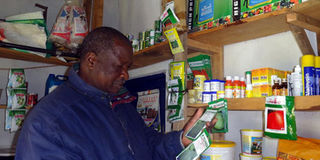Abolish taxes on agro-chemicals, they are killing industry

Amon Mghendi in his agro-chemical shop in Wanyumba, Taita Taveta county. As a nation, we have to decide whether we want to develop a vibrant pesticide industry to effectively support farming or kill it. FILE PHOTO | NATION MEDIA GROUP
What you need to know:
- Increased prices have resulted in reduced usage of pesticides, compromising yields.
- It threatens the survival of the 17 companies that manufacture pesticides in Kenya and collectively employ 19,890 people.
- Manufacturers are scaling down their operations and investments in local formulation of pesticides by up to 88 per cent.
- Organisation estimates that pests are responsible for 40 to 60 per cent of food losses in the country.
Preparations for the forthcoming General Election in August have gripped the nation.
This is perfectly understandable but there is an urgent matter that policy makers need to pay attention to, as it stands right in the way of our envisioned future state – that of an industrialising economy by 2030.
As a nation, we have to decide whether we want to develop a vibrant pesticide industry to effectively support farming – our mainstay – or kill it altogether. As it is, we are slowly but surely killing the industry by saddling it with taxes and levies.
Prior to 2014, the Value Added Tax Act, (Chapter 476 of the Laws of Kenya) and previous Finance Acts had zero-rated pest control products.
However, the VAT Act, 2013 introduced 16 per cent tax on all imported ingredients of pest control products for local processing or formulation, but maintained zero-rated status for already formulated and packaged products.
This has made locally manufactured pesticides more expensive than imports.
It threatens the survival of the 17 companies that manufacture pesticides in Kenya and collectively employ 19,890 people.
In addition to VAT, the active ingredients, carrier materials, solvents and emulsifiers attract a 10 per cent import duty and 25 per cent excise duty for imports.
Local formulators incur VAT on these substances, as well as on packaging materials, labour and transport.
The negative impact is evident. The importing of finished products manufactured outside the country is becoming more attractive compared to making them locally.
Manufacturers are scaling down their operations and investments in local formulation of pesticides by up to 88 per cent.
LOSS OF JOBS
Investments in the supply chain have also declined as demand for packaging materials and labels subsequently wanes.
This has led to loss of revenue to the government due to ‘disinvestment’ and loss of jobs in agrochemical manufacturing value chain.
This should be an issue of great national concern. For a country with dreams of industrialising tremendously within the next decade and a half, we should get our basic agricultural policies right.
The country’s long-term development blueprint – Vision 2030 – is clear on this.
Correctly so, the government is currently popularising a “Buy Kenya, Build Kenya policy”, which if successful, should boost local production and competitiveness.
This is a noble policy, but it seems the government is yet to consciously transfer this from paper to practice.
Agriculture, alongside five other sectors, comprise the backbone of Vision 2030’s economic pillar.
The sector already plays a significant role in the nation’s social and economic development, since it contributes approximately 25 per cent of the Gross Domestic Product.
It also accounts for 80 per cent of national employment. The people who live in rural Kenya are predominantly employed within the agriculture value chain.
Agriculture directly affects – nay, significantly influences – the country’s overall economic performance in any year.
But we know how tough it is for farmers to ‘coax’ their shambas and their livestock to produce enough for consumption and some extra for sale or export in the case of cash crops.
PESTS ARE A HEADACHE TO FARMERS
Why is it a backbreaking job to engage in farming in a tropical country such as Kenya? Among other factors, pests are a major headache to farmers.
It behoves farmers – and the nation – to control pests that destroy crops. The United Nation’s Food and Agriculture Organisation estimates that pests are responsible for 40 to 60 per cent of food losses in the country.
We must, therefore, acknowledge that the high taxation of locally formulated/repacked pesticides is essentially “killing” the local industry by encouraging imports and loss of jobs locally.
It is further resulting in reduced usage of farm inputs or pesticides, compromising yields.
This in turn has a major effect on food security, leading to a litany of socio-economic and political implications.
It is for these reasons that the agro-chemical industry proposes that all repackaging materials, ingredients, technical material, imported finished pesticides and labour in the industry be zero-rated.
The government should also reduce import taxes on imported ingredients and inputs for manufacturers of pesticides.
-The writer is the chief executive officer of the Agrochemicals Association of Kenya.
Checks
- All the pesticides that are in the market are registered and they have to undergo a rigorous evaluation.
- Pest Control Products Board has a risk evaluation process to address and determine potential dangers of the pesticides to the environment.
- All labels must have adequate information and we encourage users to read the guidelines before they use the products.





